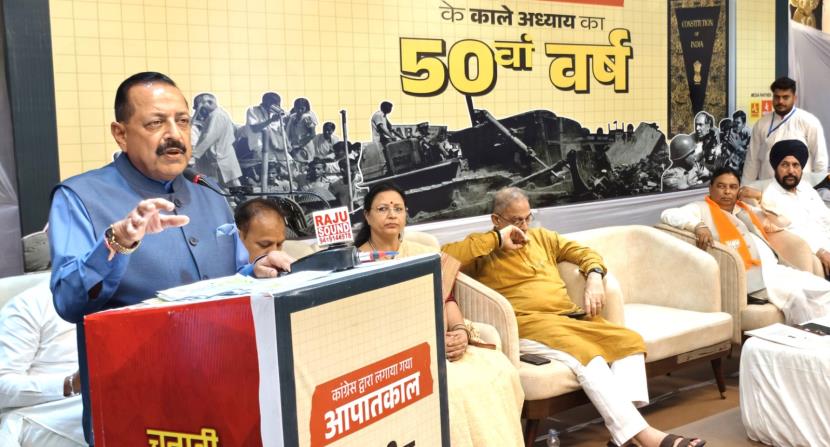Watch out, Emergency mindset still alive: Dr Jitendra

Jun 27, 2025
JAMMU: In a fiery and fact-rich address at a Youth Parliament organised by BJP Yuva Morcha here, Union Minister Dr. Jitendra Singh delivered a scathing critique of the Congress Party's historical deceit, elitist origins, and dynastic arrogance, warning the youth to remain vigilant and watch out against the "ever-morphing Emergency mindset" that is still alive and threatens the foundations of Indian democracy.
"Don't Erase the Memory of Emergency - Remember Who Betrayed Democracy" Dr. Jitendra Singh urged the youth not to allow the Emergency era to fade from memory. "Don't be in a hurry to erase it," he warned, "lest you forget who were the elements and ideologies behind it. The Emergency wasn't an aberration - it was the natural culmination of Congress culture."
Revisiting history with precision, Dr. Jitendra Singh declared "The Emergency was not a spontaneous act of power hunger - it was the cumulative outcome of the Congress legacy since its inception in 1885."
He asserted that the Indian National Congress was not born as a freedom movement, but as an elitist club of retired British civil servants and Western-educated Indians.
"From 1885 to 1930, the Congress demanded only Home Rule - not Independence. They wanted British governors to remain, merely replacing white officers with brown sahibs," he said.
Dr. Jitendra Singh contrasted Bhagat Singh's defiance with Congress's calculated caution.
He reminded that it was only after Bhagat Singh's trial and public outrage that the Congress was forced to adopt a resolution demanding full independence - and even then, only in 1931.
"They didn't lead the call for freedom. They were dragged into it by a restless India. They feared political irrelevance, not colonialism," he remarked.
Dr Jitendra Singh accused the Congress of condemning revolutionaries like Madan Lal Dhingra in 1901, even as Veer Savarkar stood alone in solidarity during their last moments. "They didn't support his sacrifice - they disowned it. Even Mahatma Gandhi condemned Dhingra's act. History must not forget that," he added.
Taking a sharp jab at the myth of Congress martyrdom, Dr. Singh said:
"Where were their sacrifices before 1930? Discovery of India was written in a jail library, not in the solitary hell of Andaman (Kala Pani). That was reserved for real freedom fighters like Savarkar and Comrade Dhanwantri from Jammu."
He challenged the Congress to name a single leader of theirs who was sent to Kala Pani. "They glorify their imprisonments post-1931 - after the British had defined 'political prisoner' status under pressure from Bhagat Singh's aftermath," he pointed out.
Highlighting the misuse of Emergency provisions, Dr. Jitendra Singh said "Indira Gandhi used Emergency to extend the term of Parliament from 5 to 6 years and forced this on Jammu & Kashmir too, taking cover under Article 370 - a blatant misuse that continued till August 5, 2019 when PM Modi rectified it."
He revealed that even when the Morarji Desai government restored 5-year terms nationally, J&K continued with 6 years citing 370. "Emergency and Article 370 were manipulated together to create a fortress of unaccountable power," he said.
Dr. Singh denounced how media, institutions, and even the Constitution were throttled between 1975-77. Quoting senior journalist L.K. Advani, he said:
"Indira Gandhi asked them to bend, and they began to crawl." He praised Indian Express and journalist Ramnath Goenka as rare examples of resistance and lamented how many "elite journalists surrendered their voice and spine." "Today's youth must learn to challenge propaganda, not peddle it," he asserted.
Closing his address, Dr. Jitendra Singh reminded the youth "The Congress did not give us freedom; it bargained for power. From Motilal Nehru to Rahul Gandhi - it was always family first, nation later."
He reiterated PM Modi's vision of Viksit Bharat by 2047, urging the youth to be torchbearers of true democracy, not the distorted legacy of the Emergency era.
"This battle is not over. The names may change, the methods may evolve, but the mindset survives. And that's why we remember Emergency - not just as history, but as a warning.
Before joining the Youth Parliament, Dr. Jitendra Singh inaugurated an exhibition curated to mark the 50th anniversary of the Emergency, referred to as the "Black Day" in Indian democratic history. The exhibition, featuring archival footage, resistance literature, and personal accounts of those jailed during the Emergency, aims to educate citizens-especially youth-about the perils of political authoritarianism.
Dr. Jitendra Singh also paid homage to freedom fighters at prominent memorials, underlining the sacrifices made by countless patriots to secure the very freedoms that were curtailed under Emergency. "Let us never forget that liberties we take for granted today were earned with immense struggle-and once snatched away in a moment of political insecurity," he said.